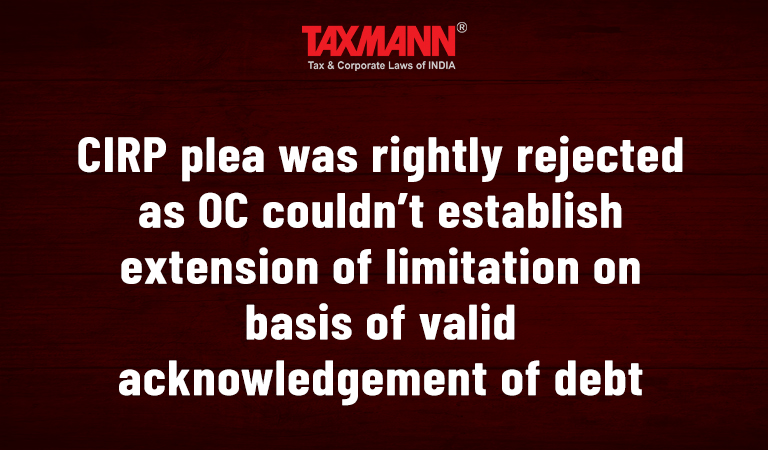CIRP plea was rightly rejected as OC couldn’t establish extension of limitation on basis of valid acknowledgement of debt
- Blog|News|Insolvency and Bankruptcy Code|
- 2 Min Read
- By Taxmann
- |
- Last Updated on 10 October, 2022

Case Details: Advance Engineering Services v. Baroda Rayon Corporation Ltd. - [2022] 142 taxmann.com 458 (NCLAT-New Delhi)
Judiciary and Counsel Details
-
- Justice Ashok Bhushan, Chairperson & Dr Alok Srivastava, Technical Member
- Ms Sheetal Parkash, Durgaprasad Halwai & Jayesh Desai, Advs. for the Appellant.
- Manu Aggarwal, Hamesh Naidu & Shubham Bhudiraja, Advs. for the Respondent.
Facts of the Case
In the instant case, an appeal was filed against the order passed by the Adjudicating Authority (NCLT) whereby the application for initiation of the CIRP u/s 9 of the IBC against the corporate debtor was rejected as it was barred by limitation.
The appellant-operational creditor performed flooring work on the mezzanine floor of plant of the respondent-corporate debtor. The appellant issued a demand notice u/s 8 of the IBC demanding outstanding dues and thereafter filed an application u/s 9 for initiation of the CIRP against the corporate debtor.
The Adjudicating Authority (NCLT) by impugned order rejected the said application as barred by limitation. Thereafter, an appeal was made to the National Company Law Appellate Tribunal (NCLAT) against the order passed by the NCLT.
The appellant contended that the corporate debtor acknowledged operational debt due to the appellant on numerous occasions through fax messages and handwritten acknowledgements.
NCLAT Held
The NCLAT observed that for the extension of limitation u/s 18 of the Limitation Act, 1963, there has to be a clear acknowledgement of debt within a period of 3 years from the date of default i.e. 19.06.2006 and thereafter mere promise to pay at a much later date, on 21.10.2015 cannot extend the period of limitation under the Act.
Further, the NCLAT observed that the documents provided by the appellant in support of his application failed to show any clear acknowledgment of the operational debt that is due.
The NCLAT held that no unequivocal or clear cut acknowledgement of the debt was found in various letters and faxes produced by the appellant. Further, the appellant had not been able to establish an extension of limitation as required under section 18 of the Limitation Act, 1963 on the basis of a valid acknowledgement provided by the corporate debtor to the operational debt, which was in default from June 2006.
Therefore, the Adjudicating Authority didn’t commit any error in holding that the section 9 application of the appellant was barred by limitation. Accordingly, the appeal was to be dismissed.
List of Cases Reviewed
-
- Order passed by NCLT-Ahmedabad in CP No. IB (AHM.) 555 of 2018, dated 27-1-2021 (para 25) affirmed.
- Asset Reconstruction Co. Ltd. v. Bishal Jaiswal [2021] 126 taxmann.com 200/166 SCL 82 (SC)/2021 SCC Online 321 (para 22) followed.
List of Cases Referred to
-
- State Bank of India v. Kanahiya Lal 2016 SCC Online Delhi 2639 (para 6)
- Uma Kumar v. Reunion Electrical Manufacturers (P.) Ltd. 2006 SCC Online Bom. 1291 (para 6)
- Asset Reconstruction Co. Ltd. v. Bishal Jaiswal [2021] 126 taxmann.com 200/166 SCL 82 (SC)/2021 SCC Online 321 (para 8)
- Mazda Agencies (Partnership Firm) v. Hemant Plastics & Chemicals Ltd. [2021] 127 taxmann.com 877 (NCL – AT)/2021 SCC Online NCLAT 69 (para 23).
Disclaimer: The content/information published on the website is only for general information of the user and shall not be construed as legal advice. While the Taxmann has exercised reasonable efforts to ensure the veracity of information/content published, Taxmann shall be under no liability in any manner whatsoever for incorrect information, if any.

Taxmann Publications has a dedicated in-house Research & Editorial Team. This team consists of a team of Chartered Accountants, Company Secretaries, and Lawyers. This team works under the guidance and supervision of editor-in-chief Mr Rakesh Bhargava.
The Research and Editorial Team is responsible for developing reliable and accurate content for the readers. The team follows the six-sigma approach to achieve the benchmark of zero error in its publications and research platforms. The team ensures that the following publication guidelines are thoroughly followed while developing the content:
- The statutory material is obtained only from the authorized and reliable sources
- All the latest developments in the judicial and legislative fields are covered
- Prepare the analytical write-ups on current, controversial, and important issues to help the readers to understand the concept and its implications
- Every content published by Taxmann is complete, accurate and lucid
- All evidence-based statements are supported with proper reference to Section, Circular No., Notification No. or citations
- The golden rules of grammar, style and consistency are thoroughly followed
- Font and size that’s easy to read and remain consistent across all imprint and digital publications are applied



 CA | CS | CMA
CA | CS | CMA
